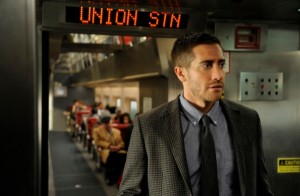Source Code review and a podcast with director Duncan Jones
 The following is a review of Source Code, but I also conducted an interview with director Duncan Jones, which you can listen to at the bottom of the page.
The following is a review of Source Code, but I also conducted an interview with director Duncan Jones, which you can listen to at the bottom of the page.
If anyone’s ever watched an airplane edit of a film, they know that often changes are made which make no sense within the logic of the movie, but are inserted to make sure the viewer isn’t reminded in any way that they are indeed inside of a contraption that could crash and burn at any time. One of the most unique examples that I’ve ever come across was oddly enough while I was on a bus, which would also use airplane edits of movies, while I was watching Get Shorty. While the deletion of the copious profanity that is key to the film’s dialogue was expected, what I hadn’t considered was that a scene where the weasely David Paymer character is supposed to have died in a plane explosion (he ends up just missing boarding the flight). In the original version of the film, his wife identifies his luggage and she immediately bursts into tears. In the case of the airplane edit, because showing an airplane actually blowing up might make the viewer uncomfortable, the scene was adjusted. You’d think they’d just awkwardly delete it, but instead, voiceover that sounded nothing like John Travolta’s lead character was added, the explosion excised, and the airplane had been changed to a train blowing up, making the luggage identification moment more ludicrous than anything else that was intended to be in the film.
 One wonders what airplane edit maneuvering might have been done to Duncan Jones’ Source Code, in which Jake Gyllenhaal’s character Colter Stevens is repeatedly sent back in time to re-experience the last 8 minutes aboard a train before it is blown up by a bomb planted by a terrorist. The train blows up so many times that there are moments where Colter looks impatient right before the immolation, knowing that he can’t stop it, and that he’s going to have to repeat the process anyway.
One wonders what airplane edit maneuvering might have been done to Duncan Jones’ Source Code, in which Jake Gyllenhaal’s character Colter Stevens is repeatedly sent back in time to re-experience the last 8 minutes aboard a train before it is blown up by a bomb planted by a terrorist. The train blows up so many times that there are moments where Colter looks impatient right before the immolation, knowing that he can’t stop it, and that he’s going to have to repeat the process anyway.
That conceit may make Source Code sound like a less comedic version of Groundhog Day, but, considering that Colter is being sent back in time as part of a military experiment to determine who the terrorist was; the film’s closer cousin is Tony Scott’s Déjà vu. In that film, the outlandish premise (in which a cop, Denzel Washington, can go back to a certain place in time and is advised by scientists as to his goals based on footage lifted from camera all over the city of New Orleans) required so much exposition that it put a lid on Scott’s normal visual overload in films like Domino and Man on Fire. Source Code has a major advantage over Déjà vu in that Denzel’s character is working within a grid, but still trying to cover an enormous amount of territory but in Source Code Colter Stevens is specifically assigned to study this one train, and so we become intimately familiarized with the location at the same time.
 That makes it easier for us to take the need for Duncan Jones to dole out the exposition on a constant basis. Colter’s character is in the dark too, and each bit of information is seen as world-altering, because if we were in his shoes, we’d think the same thing. The specificity also accounts for the efficient running time of Source Code, pre-closing credits it’s under 90 minutes, while Déjà vu is so overwhelmed and distracted by story threads and explanations that it runs over 2 hours. Jones managed to really hone in on the confusion in his first film Moon as well and here, and while there are other characters in Source Code, they’re just information conduits for Cole [Moon was a one-man show for Sam Rockwell].
That makes it easier for us to take the need for Duncan Jones to dole out the exposition on a constant basis. Colter’s character is in the dark too, and each bit of information is seen as world-altering, because if we were in his shoes, we’d think the same thing. The specificity also accounts for the efficient running time of Source Code, pre-closing credits it’s under 90 minutes, while Déjà vu is so overwhelmed and distracted by story threads and explanations that it runs over 2 hours. Jones managed to really hone in on the confusion in his first film Moon as well and here, and while there are other characters in Source Code, they’re just information conduits for Cole [Moon was a one-man show for Sam Rockwell].
It’s a shame then, that despite the fact that Source Code had smoothly motored along for almost the whole film, that someone chickened out of what was initially a very poetic and emotionally satisfying conclusion. The premise we’re given is that Colter is entering a computer program that can recreate the last 8 minutes of someone’s life, so he’s re-entering someone else’s memories. Once we accept this idea, then we can accept the movie if it obeys its own rules. But Source Code doesn’t obey its own rules and decides to hop onto the time travel track where future events can be effected, undermining the film’s construct. Was it because the other actors in the film, military scientists played by Geoffrey Wright and Vera Farmiga, would never have signed on if their roles were simply going to be expository?
 When I interviewed Duncan Jones about the film, I asked him that very question and he emphatically denied it, and said the script had always been designed the way we see it in the film, but he didn’t have a plausible explanation for the change of heart within the story. Maybe that explains why Geoffrey Wright walks with a limp and a cane throughout the film (we are never told why), simply because he needed something to do while going through the rote and dry story points. Farmiga’s character looks pained throughout, but we can understand why once we are told the reasons that Colter has specifically been chosen. Farmiga’s character is very similar to the one played by Deborah Kara Unger in David Fincher’s The Game, where she manipulates the main character through one phony experience after another. The Game was also cold and focused until it packs the emotion into the final 10 minutes, but at least there the explanation is what makes the emotion a necessary outlet, and we’re still left wondering what was really going on after the movie ends. Source Code is also cold and clinical (if we learn anything, it’s that, just like in Back to the Future, time travel gives you frost bite), but the emotion tacked on at the end is just that, tacked on. In Source Code, we don’t wonder anything at the end except why we didn’t leave the theater at the 80 minute mark.
When I interviewed Duncan Jones about the film, I asked him that very question and he emphatically denied it, and said the script had always been designed the way we see it in the film, but he didn’t have a plausible explanation for the change of heart within the story. Maybe that explains why Geoffrey Wright walks with a limp and a cane throughout the film (we are never told why), simply because he needed something to do while going through the rote and dry story points. Farmiga’s character looks pained throughout, but we can understand why once we are told the reasons that Colter has specifically been chosen. Farmiga’s character is very similar to the one played by Deborah Kara Unger in David Fincher’s The Game, where she manipulates the main character through one phony experience after another. The Game was also cold and focused until it packs the emotion into the final 10 minutes, but at least there the explanation is what makes the emotion a necessary outlet, and we’re still left wondering what was really going on after the movie ends. Source Code is also cold and clinical (if we learn anything, it’s that, just like in Back to the Future, time travel gives you frost bite), but the emotion tacked on at the end is just that, tacked on. In Source Code, we don’t wonder anything at the end except why we didn’t leave the theater at the 80 minute mark.
 Podcast below. For those who haven’t seen Source Code, beware that there are many spoilers. In a way this qualifies as a mini-rebuttal of some of the points I made above and also my reinforcing some of my positions. Also, I make fun of Sucker Punch, which I saw a few hours after seeing Source Code. Rather than review Sucker Punch, I will re-direct your attention to this Youtube clip, an HD version of Garbage’s video for their song “Special,” which is a much more succinct version of what Sucker Punch was trying to do, and considerably less headache-inducing. Anyway, enjoy the Duncan Jones interview below.
Podcast below. For those who haven’t seen Source Code, beware that there are many spoilers. In a way this qualifies as a mini-rebuttal of some of the points I made above and also my reinforcing some of my positions. Also, I make fun of Sucker Punch, which I saw a few hours after seeing Source Code. Rather than review Sucker Punch, I will re-direct your attention to this Youtube clip, an HD version of Garbage’s video for their song “Special,” which is a much more succinct version of what Sucker Punch was trying to do, and considerably less headache-inducing. Anyway, enjoy the Duncan Jones interview below.
Download the full interview.
(Right-click, Save Link As…)




stefan says:
March 3rd, 2014
1:15 am
stefan
Source Code review and a podcast with director Duncan Jones | A Regrettable Moment of Sincerity